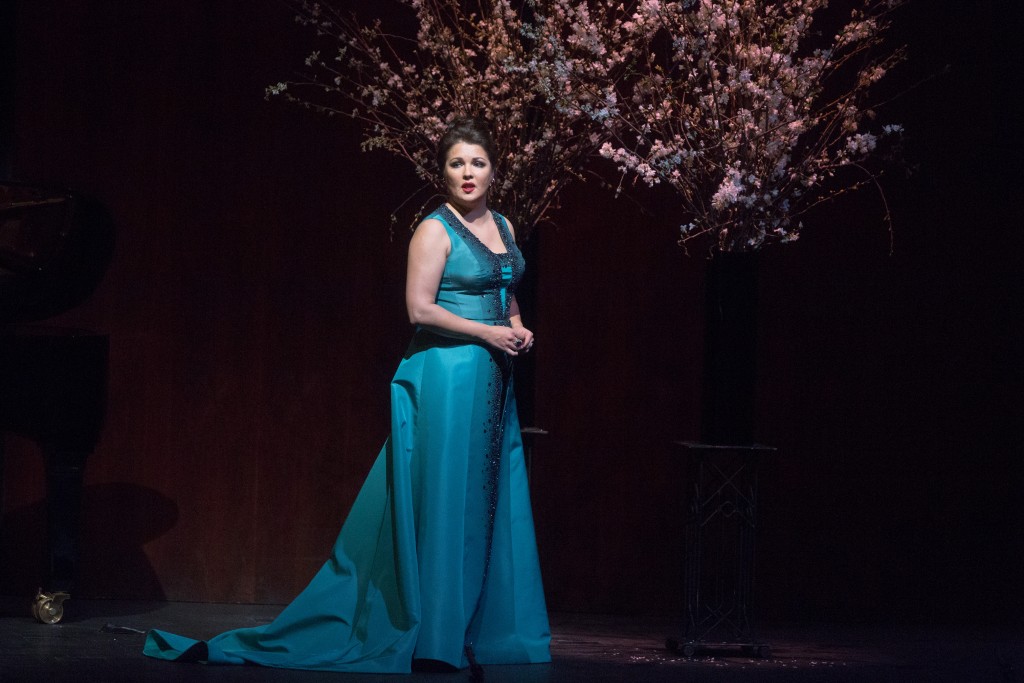Netrebko transcends diva distractions to reveal artistic depths
Soprano Anna Netrebko is a star, and so her recital at the Metropolitan Opera House Sunday afternoon was more than just singing. It was a spectacle built around musical content—songs from Rachmaninoff, Rimsky-Korsakov, and Tchaikovsky—in a setting where spectacle often prevails over art. For a time, which would prevail was an open question. The answer, fortunately, was marvelous.
The spectacle was the extra-musical content of her relationship with her fans: cameras flashing, exchanges of endearments. The sparking, beaux-arts, oyster colored gown, with matching headband, that she wore in the first half was worthy of the glamor of the silent-film era, and perfect for Oscar Sunday.
There were also ringing phones, and someone in the orchestra section who was surreptitiously recording the concert inadvertently (one hopes) played some of it back out loud, while Netrebko herself was singing. During a pause before she came out to sing the last two Rimksy-Korsakov songs of the first half, people got up in droves to head to the lobby.
Like a Broadway star delivering monologues—and like an old-fashioned opera star—she played to the back row and the balcony with broad gestures. She didn’t chew the scenery, but in the first half she did fondle the on-stage bouquets.
But she also sang beautifully, following a steadily rising arc that began with the Rachmaninoff song “Before my window”—where her tone was veiled and her vibrato was a bit unfocused—through to the two encores, “Als die alte Mutter” from Dvorak’s Gypsy Melodies and Strauss’ “Cäcille.” At the same pace and moving in inverse proportion was her stage demeanor, which went from a quasi-parody of operatic acting, to a minimal physicality that was a powerful ornament to a tremendous musical expression. As she did less, her presence grew.
All the music played to her considerable strength, which is the ability to sing with a consistent and gorgeous tone throughout her range. Her high notes and low notes are equally lustrous, and her voice is at its best when she sings softly and without vibrato, when it takes on a pleasing grain.
From Rachmaninoff to Rimsky-Korsakov to Tchaikovsky, the songs grew more complex and expressive. Having laid out this path, Netrebko went down it, and her singing grew more and more enthralling, as if the deeper the music went, the more she lost herself in it, and the greater and more intimate the performance became. Beginning as Netrebko, the opera star, she ended as Netrebko, great singer and artist.
The evening reached a plateau with Tchaikovsky’s song “Was I not a little blade of grass?” The song uses the metaphor of grass and a cranberry bush, both allowed to grow then cut down, to set up the biting story of a vibrant young girl, married off into unhappiness to an old man. Holding her last F-sharp on the word “fate,” the sheer beauty of her sound carried a huge weight of sadness, regret, and warm nostalgia.
The performance was a true partnership between Netrebko and pianist Malcolm Martineau. On her recital album In the Still of the Night, she sings much of the same Rimsky-Korsakov and Tchaikovsky songs, but is weighed down by Daniel Barenboim’s lugubrious accompaniment. Martineau, on the other hand, played with a silvery agility all afternoon. He responded to Netrebko with exciting immediacy and offered ideas back to her in a stimulating collaboration.
Their light touch together on Rimsky-Korsakov’s “To the realm of roses and wine” was in contrast to the album and exemplary of the beauty of the concert: a concentration on the essence of the notes and the vocal line, a trust that both the composer’s and Netrebko’s inherent musicianship and feeling would speak for themselves. One left the opera house with the lingering after effect of their profound artistic eloquence.




Posted Feb 29, 2016 at 3:30 pm by Antonio Vergara
I’m sorry…Do you happen to know the last two songs she sang…This was after her original performance was over…She had the flowers in her hand and, to me, those last two made me feel I was in love! I’m new to Opera and to Netrebko altogether…I would appreciate it if you could help me with the names of the songs!
Much appreciated!
-A
Posted Feb 29, 2016 at 7:37 pm by Wickie Bowman
This is a fair review, I think. I totally agree that the longer the recital went on, the more immersed. and focused, she became.
Posted Mar 01, 2016 at 1:31 pm by Pavel Rysavy
Bravo Anna